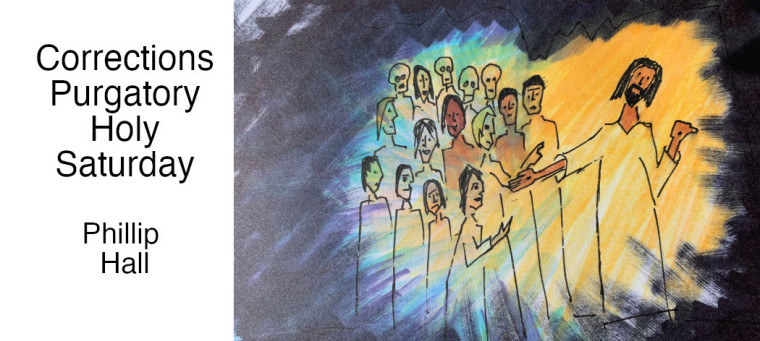
In my previous article I made a few mistakes. I got called out on them, so corrections are needed. Correction One. Universalism is not that good people go to heaven. Universalism is when all people go to heaven. Which in the context of C.S. Lewis’ narratives could only occur if you read The Great Divorce as happening after Jesus’ return. Even then, not everyone goes to heaven. C.S. Lewis, not a literal universalist.
Correction Two. While disputing the claim that C.S. Lewis was a universalist I forgot to mention a part of christian tradition. Purgatory. I forgot to mention Purgatory because I am not Catholic. I have been taught theology at a Catholic college so I should have known better. Apologies to my Catholic siblings.
Purgatory is an answer to the situation I was posing. That situation being, what happens when you have a relative or loved one who died before making a commitment to follow Jesus. It is a personal issue, as my Grandfather never made a decision about Jesus. I still want him to be there for the life after life after death. But Protestant cosmology is lacking in this area.
A Metaphysical Map
Cosmology is a metaphysical map of the universe, you know Earth, Heaven, Hell, Purgatory. What Purgatory lends us is a cosmological answer. One that is very traditional, a place of the dead. For those with sins blocking their way to heaven Purgatory is the place for them to work on their salvation.
Of course there were indulgences, offerings you could give to secure a departure for those in Purgatory. Depending on the amount you could shorten your loved ones time in Purgatory. It was one of the reasons for the Protestant fathers to leave the Catholic Church. That and the political advantage of not having to listen to the Pope.
If like me, you grew up Protestant without Purgatory, there was only a black or white answer to those who died without making a decision for Jesus. For clarity, cash for souls in Purgatory has not been official practice since the Council of Trent (1545-1563). For a Protestant there is only one way to God and that is by making a decision within the fullness of your human trajectory. You know birth, life, death.
Traditional Cosmology
Yet this place of the dead is a very traditional cosmological structure. Something that has been with human beings for a very long time. The Norse religion has Helheim and Walhalla. The Greeks of antiquity has destinations like the Elysium Fields and Tartarus. Jesus in the Gospels uses the cosmological place of the dead, Sheol, in the Parable of The Rich Man and Lazarus.
There is also the Harrowing of Hell. It is briefly mentioned in Ephesians 4:9. A verse found in creedal language where we say “He descended to Hell”. Or, as it is in the latin descendit ad inferos. If this is Sheol or Hell it depends on your understading of this line in the creed. Because some creeds use inferos (place of the dead) while others use infernos (a firey place).
If it is Sheol and not Hell then we have something different from that 8th Century morality play, The Harrowing of Hell. You know the play. Jesus goes to Hell, dunks on Satan, and releasses all the honourable dead. Adam and Eve, Abraham, Moses, King David and so on.
Sheol or Hell?
Now if this place is not Hell but is Sheol, the place of the dead, there is room to play with. Which someone has. Though it is not well known becuase theology moves at a geological pace. New ideas and imagery are heavily scrutinised and revisited many times before they become regular structures or even offical canon.
In Mysterium Paschale Catholic theologiain Hans urs von Balthasar offers a very different vision. One that is connected to Easter Saturday. Easter Saturday? You ask. Yes. Holy Saturday where Jesus is dead, in the place of the dead. Sheol. Where in the fullness of Jesus human trajectory of birth, life and death he is, like all of us will be, dead.
Balthasar asks, what happened on Holy Saturday? If Jesus is in the place of the dead, Sheol with all of the dead then they can see him. For the dead no other activity is possible. There you are in the place of the dead, and even there you cannot escape Jesus.
Nice Try But No Dice
While Purgatory is Catholic tradition, outside of that tradition it has few adherents. While Balthasar offers something else there are few supporters to champion it. Balthasar’s Holy Saturday imagery offers a cosmological artifice that is less triumphalist. Jesus is not dunking on Satan in Hell. He is, in solidarity with us, in the fullness of his humanity, with us even unto death.
Is this the final witness of Jesus? Jesus in the one place you would never expect to see him. Is this Grace at its fullest extent? Is it a step too far and creates a huge problem for salvation in Christ? To the last question, Yes. Balthasar’s Holy Saturday is seen as a step too far beyond the cross. That it is an extra act of salvation.
Yet, theology moves at a geological pace. Balthasar’s imagery is a counter position against an over the top triumphalism. Where Jesus is no action hero. But, in the fullness of his human trajectory Jesus is in Sheol with us. The light entering the darkest place of all. And then he shows us the way out.

Phillip Hall has been too long in Melbourne to see AFL in the same light as those back in Fremantle. East Fremantle born and bred, he would love to see the Dockers back in the eight. But would settle for just beating West Coast twice a year.